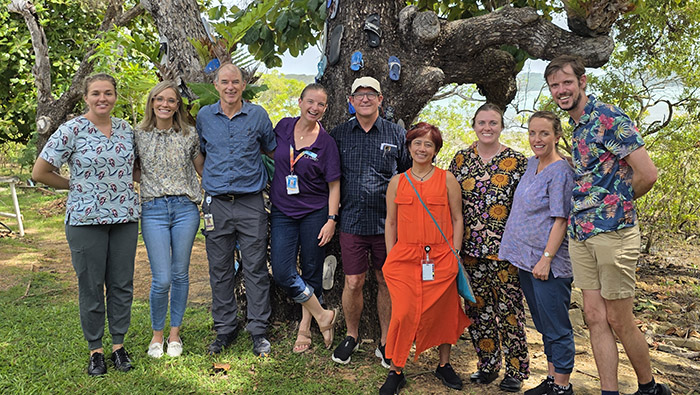Measles is a highly contagious virus, with around 90% of susceptible individuals exposed to the virus becoming infected. Due to this transmissibility, high levels of community immunity are required to prevent outbreaks. Children under five years, unvaccinated individuals, the immunocompromised, and pregnant women* are at increased risk of severe complications of measles, including pneumonia, encephalitis, and death.
Prevention of measles
Vaccination with the MMR (measles, mumps, rubella) vaccine is highly effective in preventing infection and severe disease and is the best strategy for protecting vulnerable individuals. MMR is a live attenuated vaccine which is contraindicated in pregnancy and in children under 12 months of age. Vaccination may be appropriate from 6 months of age, upon public health advice, in the setting of an outbreak.
Clinical features
Measles is an acute respiratory illness presenting initially with fever, malaise, cough, conjunctivitis, and Koplik spots on the buccal mucosa. A characteristic maculopapular rash appears after these earlier symptoms, spreading from the head to the body and then the limbs.
Symptoms may be atypical in unvaccinated pregnant women, with fever and abnormal liver function tests sometimes being the only clinical findings. Severe complications of measles are relatively common, including hospitalisation (20%), pneumonia (5%), encephalitis (1 in 1,000), death (1-3 in 1,000), and long-term subacute sclerosing panencephalitis (around 1 in 10,000).
Measles in pregnancy
Pregnant women are at increased risk of severe maternal illness and of pregnancy complications including miscarriage, stillbirth, and preterm birth. There is no specific treatment for measles, and supportive care should be provided. Measles is a notifiable disease and health department notification should be completed for new cases.
People with measles should isolate for four days after the rash appears. The decision for a mother to isolate from her unvaccinated infant should be considered on an individual basis. Breastfeeding is not thought to increase the risk of transmission beyond the close contact exposure that breastfeeding requires.
Healthcare workers caring for known measles cases should wear appropriate respiratory personal protective equipment including an N95 mask.
Vaccination
Children and non-immune adults should follow local guidance for measles vaccination. Healthcare workers are at particular risk of infection and should consider a two-dose vaccination course if they do not have documented immunity.
People in outbreak settings should follow local advice. Women planning pregnancy should have their vaccination history reviewed and be offered vaccination as required.
Management of measles exposure
Pregnant and non-pregnant people without confirmed immunity should be offered post-exposure prophylaxis.
- Non-pregnant people without additional risk factors for severe infection should receive MMR vaccination within three days of exposure, repeated at four weeks.
- Pregnant women should not receive MMR vaccination but should receive normal human immunoglobulin (0.2mg/kg up to 15mL) within six days of exposure.
- Postpartum women should receive MMR vaccination within three days of exposure.
Associate Professor Scott White
Chair, RANZCOG Women’s Health Committee
Resources
- RANZCOG: Pre-Pregnancy and Pregnancy-Related Vaccinations (C-Obs 44)
- RANZCOG: Pre-Pregnancy Counselling (C-Obs 3a)
- Australian Immunisation Handbook: Measles
- Health New Zealand/Te Whatu Ora: Measles
- RCOG: Measles, Mumps, Rubella (MMR) Vaccination and Management of Obstetric–Gynecologic Patients During a Measles Outbreak
Media enquiries
Bec McPhee
Head of Advocacy & Communications
bmcphee@ranzcog.edu.au
+61 413 258 166




